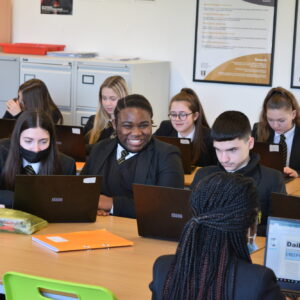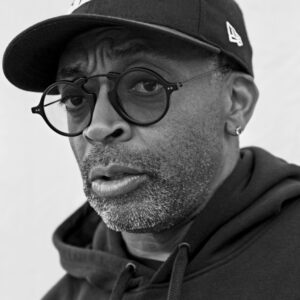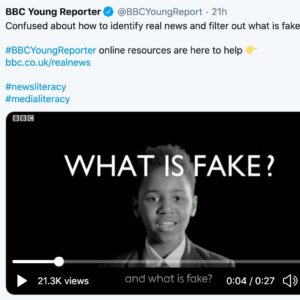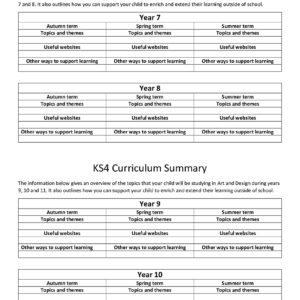The Media department at Eastbrook School develops subject knowledge and skills within the wider school ‘Character and Academics’ approach to curriculum with a focus on PROUD.
The media has changed since its origins in the fields of journalism, advertising and moving image. In fact, the media has changed the world – whether it be the way social media has been used to harness the forces of populism and nationalism or the advent of Web 2.0 which changed the entire 20th Century business model, enabling users to self-promote music, film – or themselves as a product. Furthermore, the media is constantly evolving.
So an essential endpoint for us is that students become media-literate: that they develop the skills and intelligence to navigate their experience of the media by understanding the power of the image, by interrogating the subtle practices of media producers in how that represent the world and by questioning the power of the elite.
Our students should take away the idea that for all its user-friendliness, the media is something that happens to them. They should understand what is happening – such as targeted political advertising on social media platforms and fake news – and always have the courage to question it.
The media is also an exciting, creative industry. Our students prepared to work in the fields of journalism and film. They should not only have acquired intellectual virtues but should be able to deal with challenges using performance virtues. They should have a meta-awareness of creativity as a problem solving tool.
Key Stage 4
We teach a KS4 GCSE course and an A-Level Film Studies course. Students could be deemed to be ‘KS5 ready’ – whether that involves a Media or Film A-Level – if they have mastered have developed the knowledge, skills and virtues of KS4.
A summary of the GCSE course can be found here:
By the end of KS4, students should:
be curious about and be able to question and develop principles regarding the ideologies and agendas that drive media representations in texts that dominate our cultural lives;
have developed media literacy through an understanding of semiotic analysis – the ability to decode and decipher images, moving image, design codes as well as verbal and non-verbal codes;
understand of how far changes in technology shape the media and ultimately the politics of our communities and society;
be aware the power of the elite – of global brands, big business and celebrity – and being able to consider their position in the light of moral virtues;
be able to link what happens in the media to contextual factors –the value of media texts and industries in social, historical, political and cultural terms;
have developed an understanding of their own creative skills (including resilience and perseverance) and be able to use creativity as a learning tool;
have developed practical media skills with a specific focus on film, design and journalism, and being able to work in a team to achieve this end.
Key Stage 5
A summary of the KS5 course can be found here:
By the end of KS5, after having completed the Film Studies course, students should have a theoretical understanding of:
- film history – from the silent era to contemporary film
- influential European film movements of the 20th Century, such as surrealism
- different films forms – documentary, narrative, short
- political ideas in film
- audience consumption patterns
- spectatorship
- film technologies – camera, editing, sound and mise en scene
- the changing Hollywood industry
- international, non-English speaking film
- marketing
- ideology and representation
- narrative structure
They should also have the following practical experience:
- scriptwriting
- research skills
- developing screenplays
- effective use of camera
- filmmaking
- editing
- film production
Curriculum Enrichment
A key aim is to give students the chance to visit media industries.
Recent trips involve visits to the Guardian Newspaper offices in Kings Cross and the Secret Cinema ‘Casino Royale’ set in Dagenham. We also have great working relationship with the British Film Industry centre on the South Bank, with students attending study days on documentary filmmaking and the video game industry. Both of these days gave students the chance to speak to industry professionals.
In school students have been given the chance to work on the school’s newsletter and develop their scriptwriting skills.
Homework
Homework is set using the Show My Homework platform.
We place a strong emphasis on independent thinking so homework tasks will often involve wider research into topics that we are studying in class. Due to the nature of our subject this research will go beyond reading and require students to use site like YouTube, BBC iPlayer and Netflix to watch videos, documentaries and tutorials. Students will also be expected to navigate online new websites.
Homework will involve more revision-style work towards exam and assessment periods of the term.
Career Opportunities
Employers love successful media and film students: research shows companies value communication, collaboration, critical thinking, independence, media-literacy, ICT skills, design-thinking – and our course teaches all of these.
Possible careers include:
- filmmaking
- advertising
- television production
- video game production
- media design
- journalism
- digital copywriting
- publishing
- public relations
- arts administration
- screenwriting
- marketin
- teaching
Exam Boards
AQA GCSE Media Studies 8572
OCR A Level Film Studies H010, H410
Support for exams
Useful websites for GCSE revision can be found here:
https://www.eastbrookschool.org/secondary/curriculum/y10-and-y11-online-learning-resources





